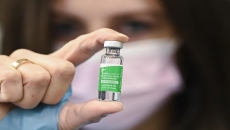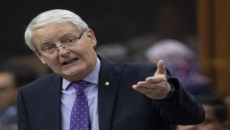Canadian beef producers are finally able to turn the page on the mad cow era, the federal agriculture minister said Thursday after an international animal-health watchdog gave the industry a long-awaited all-clear.
The Paris-based World Organization for Animal Health voted to approve Canada's bid for the "negligible risk" designation — the most favourable category, which requires proof of extensive control and surveillance measures, as well as at least 11 years since the birth of the last infected animal.
"This has been extremely difficult for family farms, and for the industry — an industry that is built by families," Agriculture Minister Marie-Claude Bibeau said in an interview
"It's kind of a page they can turn and they can look to a brighter future."
OIE has passed the official recognition that 🇨🇦 is BSE Negligible Risk confirming that the beef production system in 🇨🇦 is strong, safe & respected!✅
— Marie-Claude Bibeau (@mclaudebibeau) May 27, 2021
It will allow our beef & other cattle producers to expand their export markets + grow their businesses.https://t.co/FewKtENnAM pic.twitter.com/gevOXTDDn9
Beef producers and the federal government have been working to restore the industry's lustre ever since the first domestic case of bovine spongiform encephalopathy, or BSE — better known as mad cow disease — was detected in Canada in 2003.
That discovery prompted a global shutdown of Canadian beef exports — a body blow to an industry that exports fully half of what it produces. The Canadian Cattlemen's Association estimated the losses at upwards of $5 billion over the following three years.
The impact has been resonating ever since, due to the increased cost of additional processing measures and the persistent chill on export markets that has persisted for nearly 20 years.
An estimated 26,000 producers left the industry entirely between 2006 and 2011, and more than 8,000 square kilometres of pasture lands were converted to other uses during that period, the association said.
Thursday's decision "is a historic closing of the BSE era for Canada, which brought unprecedented hardship to our industry," president Bob Lowe said in a statement.
Lowe thanked the government, veterinarians, and Canadian farmers and ranchers, as well as domestic beef consumers, "who supported Canada's beef industry during the hardest times of BSE when Canadian beef couldn’t be exported."
The decision will give Canada additional new leverage in its efforts to find new and expanded export markets for the country's cattle and beef products, Bibeau said.
Canada has been deemed a "controlled-risk" country for BSE since 2007. The U.S., by comparison, secured negligible-risk status in 2013.
Bibeau said she's hopeful that the decision will help bring new levels of efficiency and integration to the industry in both countries, now that processors in the U.S. will no longer need to manage American and Canadian cattle separately.
She warned, however, that those efficiencies won't reappear overnight.
"We hope that now that we have reasonable-risk status, it will ease our collaboration and to export together to South Korea, for example," she said.
"But it's not something that because we have a negligible-risk status today, that starting today allows us to open up this discussion."
Bibeau also said she remains hopeful that the U.S. won't resurrect country-of-origin labelling rules for beef, which were repealed in 2016. Currently, imported beef can be sold as an American product, even if it was raised elsewhere but processed in the U.S.
Opponents of the measure, including Canada and Mexico, have successfully argued at the World Trade Organization that the measures only increase costs, diminish efficiency and run counter to the principles of North American trade.
Bibeau said Agriculture Secretary Tom Vilsack, who has publicly expressed support for the idea of new labelling rules for beef products, has assured her that the U.S. will not proceed with any measure that is not "trade-compliant."
"On both sides, we are doing the best to support our industries," Bibeau said.
"At the same time, we are so integrated and such close partners that we may challenge each other once in a while. But overall, doing business together is so important in the (agriculture) sector that we'll have a strong but fair conversation."






